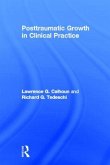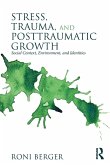Kanako Taku, Richard G. Tedeschi, Jane Shakespeare-Finch
Posttraumatic Growth
Theory, Research, and Applications
Kanako Taku, Richard G. Tedeschi, Jane Shakespeare-Finch
Posttraumatic Growth
Theory, Research, and Applications
- Gebundenes Buch
- Merkliste
- Auf die Merkliste
- Bewerten Bewerten
- Teilen
- Produkt teilen
- Produkterinnerung
- Produkterinnerung
Posttraumatic Growth provides a wide range of answers to questions concerning knowledge of posttraumatic growth (PTG) theory, its synthesis and contrast with other theories and models, and its applications in diverse settings.
Andere Kunden interessierten sich auch für
![Posttraumatic Growth in Clinical Practice Posttraumatic Growth in Clinical Practice]() Lawrence G. CalhounPosttraumatic Growth in Clinical Practice176,99 €
Lawrence G. CalhounPosttraumatic Growth in Clinical Practice176,99 €![Stress, Trauma, and Posttraumatic Growth Stress, Trauma, and Posttraumatic Growth]() Roni BergerStress, Trauma, and Posttraumatic Growth44,99 €
Roni BergerStress, Trauma, and Posttraumatic Growth44,99 €![Stress, Trauma, and Posttraumatic Growth Stress, Trauma, and Posttraumatic Growth]() Roni BergerStress, Trauma, and Posttraumatic Growth194,99 €
Roni BergerStress, Trauma, and Posttraumatic Growth194,99 €![The Posttraumatic Self The Posttraumatic Self]() The Posttraumatic Self66,99 €
The Posttraumatic Self66,99 €![The Posttraumatic Self The Posttraumatic Self]() The Posttraumatic Self182,99 €
The Posttraumatic Self182,99 €![The Art of Strategic Therapy The Art of Strategic Therapy]() Jay HaleyThe Art of Strategic Therapy152,99 €
Jay HaleyThe Art of Strategic Therapy152,99 €![Self Supervision Self Supervision]() Patrick J. MorrissetteSelf Supervision50,99 €
Patrick J. MorrissetteSelf Supervision50,99 €-
-
-
Posttraumatic Growth provides a wide range of answers to questions concerning knowledge of posttraumatic growth (PTG) theory, its synthesis and contrast with other theories and models, and its applications in diverse settings.
Produktdetails
- Produktdetails
- Verlag: Routledge
- Seitenzahl: 266
- Erscheinungstermin: 16. Mai 2018
- Englisch
- Abmessung: 235mm x 157mm x 19mm
- Gewicht: 540g
- ISBN-13: 9781138675018
- ISBN-10: 1138675016
- Artikelnr.: 52712986
- Herstellerkennzeichnung
- Libri GmbH
- Europaallee 1
- 36244 Bad Hersfeld
- gpsr@libri.de
- Verlag: Routledge
- Seitenzahl: 266
- Erscheinungstermin: 16. Mai 2018
- Englisch
- Abmessung: 235mm x 157mm x 19mm
- Gewicht: 540g
- ISBN-13: 9781138675018
- ISBN-10: 1138675016
- Artikelnr.: 52712986
- Herstellerkennzeichnung
- Libri GmbH
- Europaallee 1
- 36244 Bad Hersfeld
- gpsr@libri.de
Richard G. Tedeschi, PhD, is a professor of psychological science at the University of North Carolina at Charlotte, where he conducts research on posttraumatic growth and serves as core faculty for the health psychology doctoral program. Jane Shakespeare-Finch, PhD, is a professor in psychology and counseling at Queensland University of Technology in Brisbane, Australia, and president of the Australasian Society for Traumatic Stress Studies. Dr. Shakespeare-Finch has conducted PTG research for 20 years and published widely. Kanako Taku, PhD, is an associate professor in the Department of Psychology at Oakland University in Michigan. She has conducted PTG research cross-culturally and authored articles and books in English and Japanese. Lawrence G. Calhoun, PhD, is a professor emeritus of psychological science at the University of North Carolina at Charlotte. Along with Dr. Tedeschi, he is one of the pioneers in research and applications of posttraumatic growth.
SECTION I: POSTTRAUMATIC GROWTH THEORY 1. What Is Posttraumatic Growth? 2.
A History of the Concept of Posttraumatic Growth in Psychology and Related
Disciplines 3. Religion, Philosophy, and Posttraumatic Growth 4.
Posttraumatic Growth as Process and Outcome 5. Posttraumatic Growth as
Common and Universal Experience 6. The Validity of Reports of Posttraumatic
Growth 7. Components of the Theoretical Model of Posttraumatic Growth 8.
Theories Related to PTG SECTION II: POSTTRAUMATIC GROWTH RESEARCH 9.
Qualitative Research on Posttraumatic Growth 10. Quantitative Measures of
Posttraumatic Growth 11. Cross-Cultural Research 12. Developmental Research
on Posttraumatic Growth 13. Posttraumatic Growth and Neurological and
Biological Mechanisms 14. Ideal Research Strategies for Posttraumatic
Growth SECTION III: APPLICATION 15. Facilitation of Posttraumatic Growth
through Expert Companionship 16. Intervention Models for Posttraumatic
Growth 17. PTG Beyond the Individual 18. Vicarious and Secondary PTG 19.
Non-Posttraumatic Growth 20. Final Considerations
A History of the Concept of Posttraumatic Growth in Psychology and Related
Disciplines 3. Religion, Philosophy, and Posttraumatic Growth 4.
Posttraumatic Growth as Process and Outcome 5. Posttraumatic Growth as
Common and Universal Experience 6. The Validity of Reports of Posttraumatic
Growth 7. Components of the Theoretical Model of Posttraumatic Growth 8.
Theories Related to PTG SECTION II: POSTTRAUMATIC GROWTH RESEARCH 9.
Qualitative Research on Posttraumatic Growth 10. Quantitative Measures of
Posttraumatic Growth 11. Cross-Cultural Research 12. Developmental Research
on Posttraumatic Growth 13. Posttraumatic Growth and Neurological and
Biological Mechanisms 14. Ideal Research Strategies for Posttraumatic
Growth SECTION III: APPLICATION 15. Facilitation of Posttraumatic Growth
through Expert Companionship 16. Intervention Models for Posttraumatic
Growth 17. PTG Beyond the Individual 18. Vicarious and Secondary PTG 19.
Non-Posttraumatic Growth 20. Final Considerations
SECTION I: POSTTRAUMATIC GROWTH THEORY 1. What Is Posttraumatic Growth? 2.
A History of the Concept of Posttraumatic Growth in Psychology and Related
Disciplines 3. Religion, Philosophy, and Posttraumatic Growth 4.
Posttraumatic Growth as Process and Outcome 5. Posttraumatic Growth as
Common and Universal Experience 6. The Validity of Reports of Posttraumatic
Growth 7. Components of the Theoretical Model of Posttraumatic Growth 8.
Theories Related to PTG SECTION II: POSTTRAUMATIC GROWTH RESEARCH 9.
Qualitative Research on Posttraumatic Growth 10. Quantitative Measures of
Posttraumatic Growth 11. Cross-Cultural Research 12. Developmental Research
on Posttraumatic Growth 13. Posttraumatic Growth and Neurological and
Biological Mechanisms 14. Ideal Research Strategies for Posttraumatic
Growth SECTION III: APPLICATION 15. Facilitation of Posttraumatic Growth
through Expert Companionship 16. Intervention Models for Posttraumatic
Growth 17. PTG Beyond the Individual 18. Vicarious and Secondary PTG 19.
Non-Posttraumatic Growth 20. Final Considerations
A History of the Concept of Posttraumatic Growth in Psychology and Related
Disciplines 3. Religion, Philosophy, and Posttraumatic Growth 4.
Posttraumatic Growth as Process and Outcome 5. Posttraumatic Growth as
Common and Universal Experience 6. The Validity of Reports of Posttraumatic
Growth 7. Components of the Theoretical Model of Posttraumatic Growth 8.
Theories Related to PTG SECTION II: POSTTRAUMATIC GROWTH RESEARCH 9.
Qualitative Research on Posttraumatic Growth 10. Quantitative Measures of
Posttraumatic Growth 11. Cross-Cultural Research 12. Developmental Research
on Posttraumatic Growth 13. Posttraumatic Growth and Neurological and
Biological Mechanisms 14. Ideal Research Strategies for Posttraumatic
Growth SECTION III: APPLICATION 15. Facilitation of Posttraumatic Growth
through Expert Companionship 16. Intervention Models for Posttraumatic
Growth 17. PTG Beyond the Individual 18. Vicarious and Secondary PTG 19.
Non-Posttraumatic Growth 20. Final Considerations









